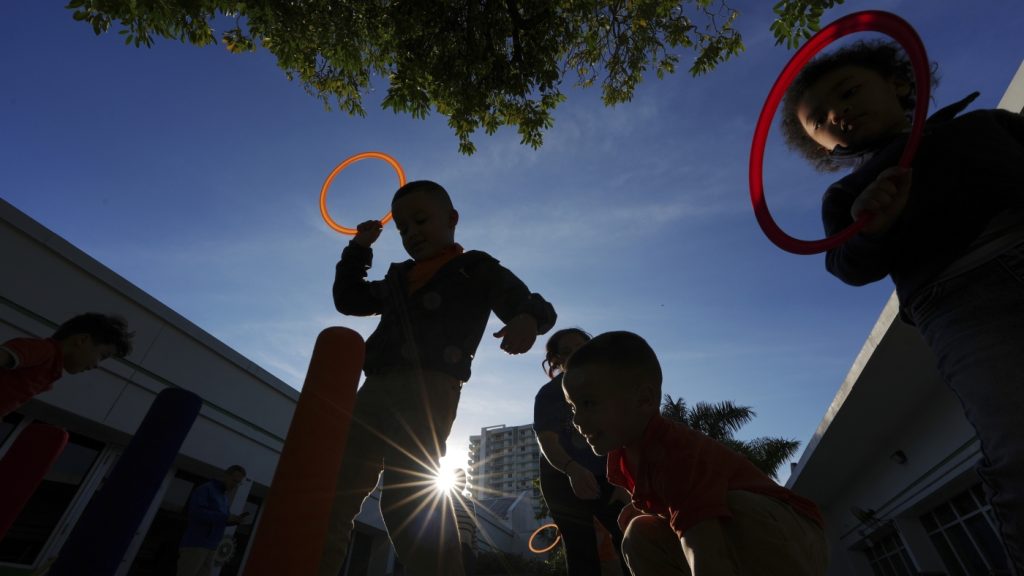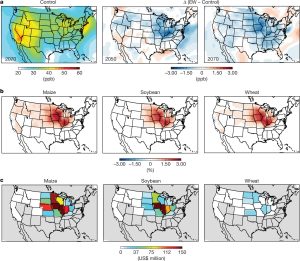
Children play during aftercare for the Head Start program at Easterseals South Florida, an organization that gets about a third of its funding from the federal government on Wednesday, Jan. 29, in Miami.
Rebecca Blackwell/AP
hide caption
toggle caption
Rebecca Blackwell/AP
For more than a week, Paula Tomko of Central Virginia Health Services waited for federal funding from the Department of Health and Human Services. The organization runs 20 community health centers across the state.
“Normally we would put the request in one day and it would be in our bank account the next day,” she explains. On January 24, her organization submitted a request through Payment Management Services, a portal run by HHS.
But the funds never came. Many other organizations that receive federal funding through the same portal also found that they could not draw down reimbursements starting last week.
The timing of the system’s failures coincides with the Trump administration’s ordered freeze of federal grant funding, including a White House Office of Management and Budget memo issued on January 27, which was later blocked by a federal judge and rescinded by OMB.
“We’ve been doing this for over 50 years — we got started in 1970, and, and we’ve never had this issue,” she says. “We’re really uncertain as to exactly what that means.”
Her organization has enough reserves to make payroll for their 550 staff members at the moment, she says, but not for long.
“We’ve been honest with our staff, we’ve said, ‘Hey, this is a cash flow issue right now,'” she explained.
To be prudent, the organization is making small changes like limiting travel, and only stocking up on supplies for short term needs. Patients haven’t had their care interrupted yet.
But some health care centers in near Richmond, Va., did close and had to transfer patients to centers in its network when they weren’t able to access federal funds, according to VPM News.
Community health care centers provide primary and preventive care to millions of patients, many of them low-income, whether they are insured or not. In many parts of the country, they are the only health care centers offering primary care besides hospital emergency departments.
“People hear that the freeze was lifted, they assume we’re back to normal and we’re really not — we’re really not,” Tomko says. “We thought we had a contract, and we can’t access the funds that were contracted.”
Lack of communication
A spokesperson for the Department of Health and Human Services, which runs the payment system, sent NPR a statement saying that “technical issues” caused an outage.
“Users may be experiencing lags due to the high volume of requests. HHS is working through the Program Support Center to help expedite resolution as quickly as possible,” the spokesperson wrote.
Community health centers across the country have been affected, but unevenly. Advocates for Community Health, which represents community health centers, wrote in a statement that clinics in Maine, Nebraska, Illinois, Michigan, along with Virginia, had experienced interruptions.
Some Head Start programs, which receive HHS grant funds as well, also reported problems.
“We are aware of 37 grant recipients serving approximately just under 15,000 children in 20 states across the country and DC and Puerto Rico that are still waiting [for funds],” says Tommy Sheridan, deputy director of the National Head Start Association.
Tomko of Central Virginia Health Services says grantees aren’t being given any guidance on how to navigate the problem, “whether it’s, delete your previous requests and do new ones, or do it every day in small amounts — there’s no guidance coming through.” This week, her organization canceled the request from January 24 and submitted a new one, unsure of whether that would help or hinder the problem.
A recorded message on the federal payment portal helpline says: “We have no information to share regarding the delay of payments at this time. Please continue to visit the website for updates.”
On Thursday, a group of Democratic Senators sent a letter to the acting Secretary of Health and Human Services asking for answers about the funding delays.
Navigating uncertainty in Head Start
For Head Start providers who haven’t been able to access the system they depend on, the last week has been “really emotional,” said Abbi Kruse, the executive director of The Playing Field, an early childhood center in Madison, Wis., that uses Head Start dollars to cover some of its programming.
“The recent thing was really just the uncertainty,” she said. If the funding delays had continued, she said, “it would really have a domino effect on our whole operation.”
Since last week, she said, she’s heard from families who were afraid of losing their childcare, and from teachers afraid of losing their jobs.
“A lot of our families are either homeless or they are at risk of becoming homeless, and even a few days off work can make a difference for them between being able to pay their rent and not being able to pay their rent,” she said.
Kruse added that maintaining The Playing Field’s revenue model is a difficult balance in the best of times, and that providers are already squeezed because of inflation.
“We just rely on so many different forms of funding to make sure that our program is accessible to low-income families,” she said. “It’s a rough time anyway. And so then adding on top of that, this federal money that’s always been stable, taking that away would have made things just — it would have felt really impossible to me to figure that out.”
On Friday, half of the funds that serve Kruse’s center were released, with the rest promised for Monday. At least four other Head Start grantees in Wisconsin were also facing delays; as of Friday, all had seen some resumption of funding, according to Jen Bailey of the Wisconsin Head Start Association.
Kruse said she is relieved that her program has seen its federal funds resume, but she remains on edge.
“What are the plans for Head Start? Who’s making those decisions? How are they making those decisions?” she said. “I feel relieved for today, but I still feel really uncertain about the future.”
Looming budget uncertainty
Karen Haring runs Libera, a community nonprofit in West Virginia that supports young women. This week, the organization broke ground on a new building they’re preparing to renovate as a community center with affordable housing for 8 young women.
Libera also had problems getting funding as usual through the HHS grant portal. Instead of funding arriving the next day after a request, as usual, it took more than a week.
The unexpected hurdles in accessing funds now make them worry about their future.
“The concern there is we have this building, it looks like the funding will come through and keep coming through for renovating the building, but what if we don’t have the staff to carry out the programs? What if we don’t have the staff to be able to run the building?” Haring asks.
Tomka in Virginia agrees that the threat of a government shutdown is hanging over every organization that receives these federal health grants. They’re using their reserves now to cover the grant funding delays.
“How long can we cover this and when do we have to tighten our belt even more and start impacting services?” she asks.
At some point, funding delays could really start to hit the patients and families that rely on these community centers.
Simmons-Duffin reported from Washington; van Wagtendonk reported from Madison, Wisc. NPR’s White House Correspondent Tamara Keith contributed to this report.









